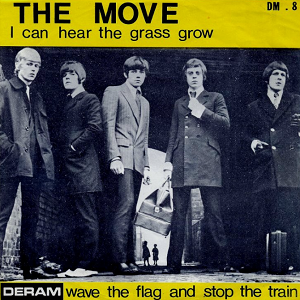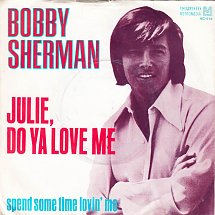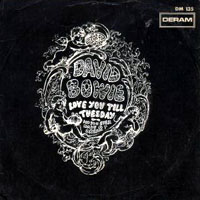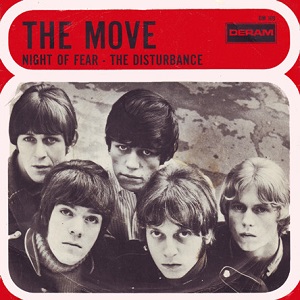 W
W"Baby, Please Don't Go" is a traditional blues song that was popularized by Delta blues musician Big Joe Williams in 1935. Many cover versions followed, leading to its description as "one of the most played, arranged, and rearranged pieces in blues history" by French music historian Gérard Herzhaft.
 W
W"Bend Me, Shape Me" is a song written by Scott English and Larry Weiss. It was first recorded by The Outsiders as a track on their album The Outsiders In in 1966. The best-known version of the song is the 1967 single released by The American Breed that peaked at No. 5 on the US Billboard Hot 100 in early 1968, No. 3 in South Africa, and No. 24 on the UK Singles Chart.
 W
WVanity Fare are an English pop/rock group formed in 1966. They had the million-selling song, "Hitchin' a Ride", which became a worldwide hit in 1970.
 W
W"I Can Hear the Grass Grow " is the second single by the Move, written by Roy Wood. The song was first released on 31 March 1967, and reached number 5 in the UK Singles Chart on 10 May 1967, staying for ten weeks in the charts. "I Can Hear the Grass Grow" was the second of a string of four consecutive top-5 singles in the UK.
 W
W"I Love My Dog" is a song written by Cat Stevens, and was his first single, appearing the following year on his debut album Matthew and Son. Stevens later acknowledged that he had essentially written the lyrics to the music of American jazz multi-instrumentalist Yusef Lateef's "The Plum Blossom", from his 1961 Eastern Sounds. Stevens indicated that he "told Yusef Lateef about it, gave him a big cheque, and in fact, started paying him royalties." The song is now released with credits that include Yusef Lateef.
 W
W"I Was Kaiser Bill's Batman" was a hit single in 1967 composed by British songwriters Roger Cook and Roger Greenaway. It was a novelty record, performed mostly by whistling. The name Whistling Jack Smith, credited on the most commercially successful recording, was a play on the name of the baritone singer of the 1920s, 1930s and 1940s, Whispering Jack Smith.
 W
W"I'm Gonna Get Me A Gun" is a song that Cat Stevens wrote, composed, and recorded in 1967, and was produced by Mike Hurst of Decca Records's recently added Deram Records label. It was released as a 45 in the UK, reaching number 6 in the UK Singles Chart, and it was featured on U.S pressings of his debut album Matthew and Son.
 W
W"Jet" is a song by Paul McCartney and Wings from their third studio album Band on the Run (1973). It was the first British and American single to be released from the album. The song's title was inspired by McCartney's black Labrador named Jet.
 W
W"Julie, Do Ya Love Me" is a song written by Tom Bahler, which was a hit recording in 1970 for Bobby Sherman and later the same year for White Plains.
 W
W"The Laughing Gnome" is a song by English singer David Bowie, released as a single on 14 April 1967. A pastiche of songs by one of Bowie's early influences, Anthony Newley, it was originally released as a novelty single on Deram Records in 1967. The track consists of Bowie meeting and conversing with a gnome, whose sped-up voice delivers several puns on the word "gnome". At the time, "The Laughing Gnome" failed to provide Bowie with a chart placing, but on its re-release in 1973 it reached number six on the British charts and number three in New Zealand.
 W
W"Let's Go to San Francisco" is the only UK-charting single by the British pop group The Flower Pot Men. The song was written and produced by John Carter and Ken Lewis, engineered by John Mackswith and released in 1967 on 7" single format. Lead vocals were by Tony Burrows, who later did vocals for groups like Edison Lighthouse, First Class, White Plains, and The Brotherhood of Man. It is regarded as a work of the 1960s California Sound.
 W
W"Love You till Tuesday" is a song written and performed by David Bowie. The first version of the song, recorded in February 1967, was included on Bowie's debut album. A second version, released as a single, was recorded on 3 June 1967 and released on 14 July 1967. The single garnered good notices from the music press but, like his earlier singles, failed to break into the British charts. It was his final new release for Deram Records. Bowie's 1969 showpiece film Love You till Tuesday took its name from the song, which also featured over the opening credits.
 W
W"Matthew and Son" is a single written, composed, and performed by Cat Stevens. It was selected as the title song for his 1967 debut album. Stevens was a newly signed teenage singer-songwriter, who performed to elaborate arrangements quite different from the skiffle which had, in part, inspired him to begin writing and performing.
 W
W"My Baby Loves Lovin'" was the top selling single for the British pop group White Plains. The song was written by Roger Cook and Roger Greenaway, recorded on 26 October 1969, and released on 9 January 1970 on the Decca Records imprint, Deram Records.
 W
W"Never Comes the Day" is a 1969 single by the progressive rock band the Moody Blues. It was written by band member Justin Hayward, and was the only single released from their 1969 album On the Threshold of a Dream. The song was edited from the album version of 4:43 down to 2:42. The single edit omits the second verse and simply goes into the longer chorus after the first verse. A similar edit was done on the Justin Hayward/John Lodge song "I Dreamed Last Night", but that version ends cold. Despite the fact that the album was a number-one hit in the UK, "Never Comes the Day" was a commercial flop as a single, and did not chart in the UK. The single also included Mike Pinder's "So Deep Within You," another track from the same album, on the B-side.
 W
W"Night of Fear" is the debut single by British rock band the Move, written by Roy Wood. The song was first released on 9 December 1966, and reached number 2 in the UK Singles Chart on 26 January 1967, staying for ten weeks in the charts. "Night of Fear" was the first of a string of four consecutive top-5 singles in the UK.
 W
W"Nights in White Satin" is a song by the Moody Blues, written and composed by Justin Hayward. It was first featured as the segment "The Night" on the album Days of Future Passed. When first released as a single in 1967, it reached number 19 on the UK Singles Chart and number 103 in the United States in 1968. It was the first significant chart entry by the band since "Go Now" and its recent lineup change, in which Denny Laine and Clint Warwick had resigned and both Hayward and John Lodge had joined.
 W
W"Ride My See-Saw" is a hit 1968 single by the English progressive rock band the Moody Blues. It was written by the band's bassist John Lodge, and was first released on the Moody Blues' 1968 album In Search of the Lost Chord. It was the second of two singles from that album, the other being "Voices in the Sky".
 W
W"Rubber Band" is a song written and performed by the English popular music artist David Bowie. The song was first recorded in late 1966 and released as a single in the UK in December of the same year. This release marked the beginning of Bowie's recording contract with Deram and the artist's baroque pop phase. The song was re-recorded in February of the following year and it is this version that appears on Bowie's first album, David Bowie (1967). Roy Carr and Charles Shaar Murray see the song as an 'early manifestation of the Edwardian fixation that affected the more whimsical areas of mid-60's Britpop'.
 W
W"Tuesday Afternoon" is a 1968 single by English symphonic rock band the Moody Blues, which was presented in its original album form on their 1967 album Days of Future Passed in two parts.
 W
W"United We Stand" is a song written by Tony Hiller and Peter Simons. It was first released in 1970 by The Brotherhood of Man, becoming the band's first hit, peaking at #13 in the U.S., #9 in Canada, and #10 in the U.K. The song spent 15 weeks on the charts, and is ranked as the 64th biggest U.S. hit of 1970. It also reached #8 in Australia.
 W
W"Voices in the Sky" is a hit 1968 single by the progressive rock band the Moody Blues, and it was written by their lead guitarist Justin Hayward. It was released as a single in June 1968, with "Dr. Livingstone, I Presume" on the B-side. It was later released on their 1968 album In Search of the Lost Chord, and was the first of two singles from that album, the other being "Ride My See-Saw".
 W
W"A Whiter Shade of Pale" is a song by the English rock band Procol Harum that was issued as their debut record on 12 May 1967. The single reached number 1 in the UK Singles Chart on 8 June and stayed there for six weeks. Without much promotion, it reached number 5 on the US Billboard Hot 100. One of the anthems of the 1967 Summer of Love, it is one of the most commercially successful singles in history, having sold more than 10 million copies worldwide. In the years since, "A Whiter Shade of Pale" has become an enduring classic, with more than 1000 known cover versions by other artists.